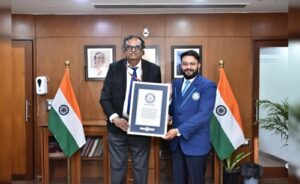Dr. Nagendra Singh (1909–1993) was a distinguished Indian jurist and diplomat who made significant contributions to international law. He became the first Indian judge of the International Court of Justice (ICJ), serving from 1973 to 1988. His selection to the ICJ was a remarkable achievement and a milestone for India’s presence in the realm of international law and diplomacy.
Born: Dr. Nagendra Singh was born on October 12, 1909, in Bhilai, Madhya Pradesh (then part of the Central Provinces).
Education: He pursued his education in law and international relations, studying at some of the most prestigious institutions in India and abroad:
B.A. from Allahabad University.
He obtained his M.A. and LL.B. degrees from University of Allahabad.
Later, he attended Oxford University, where he earned a Doctorate in Law (D.C.L.).
Dr. Singh was highly regarded as a scholar, not just for his academic excellence but also for his deep understanding of both Indian and Western legal systems.
Dr. Nagendra Singh’s career began in the legal and diplomatic fields. He was a trained lawyer, practicing in various courts in India, and his intellectual capabilities earned him a reputation as a legal expert.
Diplomatic Service: In the 1940s, he joined the Indian Foreign Service (IFS), where he quickly rose through the ranks due to his diplomatic acumen. He represented India at several international forums and played a key role in shaping India’s foreign policy during the post-independence period.
He was also India’s Ambassador to Denmark, Norway, and Sweden, where he worked on fostering strong diplomatic relations and promoting international cooperation.
Dr. Nagendra Singh was a visionary in the field of international law, and his work helped establish him as a prominent figure in legal circles worldwide. His key contributions include:
Publications: He wrote extensively on international law, especially on subjects like international human rights, peace, disarmament, and diplomatic relations. His publications were highly regarded in academic circles and contributed to the global understanding of India’s legal and philosophical traditions.
Legal Expertise: He was known for his expertise in international treaties and customary international law, and his work shaped India’s approach to the global legal order. He played an important role in India’s participation in key global legal institutions such as the United Nations and the International Court of Justice.
Appointment to ICJ: In 1973, Dr. Nagendra Singh made history by becoming the **first Indian judge to be appointed to the International Court of Justice (ICJ). The ICJ, based in The Hague, Netherlands, is the principal judicial organ of the United Nations, responsible for settling disputes between states and giving advisory opinions on international legal questions.
Dr. Singh’s election to the ICJ was a significant moment for India, as it reflected the country’s growing stature in the global legal community and its commitment to the rule of law at the international level.
Role at the ICJ: During his tenure, Dr. Singh became known for his calm and thoughtful approach to resolving disputes between countries. His legal knowledge, coupled with his diplomatic experience, made him an effective and respected figure at the ICJ. His contributions extended beyond case adjudication to efforts aimed at advancing the cause of international peace and justice.
Notable Cases: During his time on the ICJ, Dr. Singh participated in several important cases, notably those involving issues of territorial disputes, international trade, human rights, and the use of force. He was involved in legal interpretations that affected international law as it pertains to sovereignty, state responsibility, and the application of treaties.
ICJ Presidency: In 1976, Dr. Nagendra Singh was appointed as the President of the ICJ for a term. His leadership during this period was marked by his diplomatic tact and his commitment to ensuring the impartiality and integrity of the court.
Dr. Nagendra Singh’s work at the International Court of Justice significantly enhanced India’s reputation in the global legal arena. As the first Indian judge at the ICJ, he laid the foundation for future Indian jurists and diplomats to follow in his footsteps.
Global Influence: His contributions to international law were recognized globally, and he became an important figure in the legal and diplomatic communities. He worked to uphold the values of justice, peace, and the rule of law, all of which were central to the work of the ICJ.
Awards and Honors: Throughout his career, Dr. Singh received numerous honors for his contributions to law and diplomacy, both in India and abroad. He was highly respected for his intellectual capabilities and his ability to bridge cultures through law.
After retiring from the ICJ in 1988, Dr. Singh continued his work as a legal consultant, and his influence remained strong in the realm of international law.
He also served on various international bodies and continued to publish on matters related to international law, diplomacy, and peacekeeping.
Died: Dr. Nagendra Singh passed away on February 1, 1993, leaving behind a rich legacy in international law, and a lasting influence on Indian diplomacy.
Dr. Nagendra Singh was a trailblazer in Indian and international legal circles, becoming the first Indian judge at the International Court of Justice (ICJ) in 1973. His career was marked by his legal expertise, diplomatic finesse, and commitment to justice, peace, and international cooperation. He played a key role in shaping India’s global legal standing and contributed significantly to the development of international law during his tenure at the ICJ.
His life’s work remains an important chapter in the history of both Indian diplomacy and the International Court of Justice.







